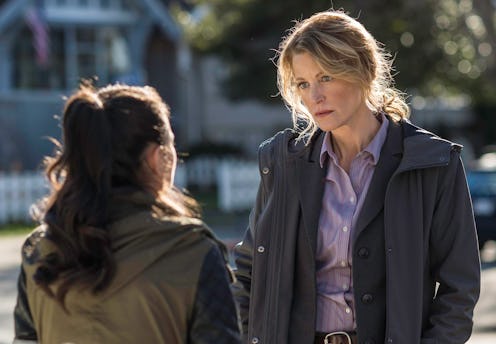
I made a little deal with myself when I heard Fox was remaking Broadchurch with Anna Gunn as the female lead: I wasn't going to go back and watch the original Broadchurch. Instead, I wanted to approach Gunn's performance without expectation (well, beyond the expectation that comes along with being a two-time Emmy winner who played Walter White's wife), so my observations may appear a little blasé to fans of the original. Still, there's one important distinction to be made, even if Gracepoint is supposedly a shot-for-shot remake of Broadchurch in its first few episodes: This is the first time the story is being told to a network TV-sized audience stateside. And so far, Gracepoint has made an important change for women, specifically mothers, in the TV crime genre.
Gracepoint opens with the murder of a young boy named Danny, and as part of the reveal of the devastating news, we follow his mother through her morning until she realizes what has happened to her dear boy. And while I always dread the moment a mother finds out her child has been killed because the concept — no matter how many times it happens on network procedurals — never ceases to devastate me as a viewer. But the other part of that dread is the fact that in almost every portrayal of a grieving mother, women are show in hysterics, which police officers holding them back as they flail about. They're always just a few notches away from David Lynch's screeching Mrs. Palmer on Twin Peaks. And while these countless mothers mourning their children on TV are allowed to be emotional, and they're allowed to be destroyed, and they're allowed to be devastated, they don't need to be made into spectacles.
And that's exactly what Gracepoint proves, both with Gunn's Ellie Miller, mother and detective, and with the victim Danny's mother. True, grief is all over Danny's mother's face, but she's hardly a prop there to bully us into an emotional, somewhat hysterical reaction. She's a realistically grieving mother. And she is a real person.
Plus, we're given almost the same amount of time with Danny's grieving father, who's just as destroyed as his wife. He doesn't apologize for his wife or attempt to quiet her tears and grief. He's not trying to contain her. The grief is genderless, and it affects everyone — even the newcomer, David Tennant's Detective Emmet Carver when he steps foot in Danny's old bedroom.
But beyond stages of grief, Gracepoint simply treats mothers like the very real people they are. Novel concept, I know. They aren't painted as super heroes, striving to attain that goal that only women are expected to wonder about ("having it all"). They aren't shown as juggling all the little moments of their lives, like a scene from a plucky Kelly Ripa commercial for washers and dryers. The mothers on Gracepoint aren't defined by their decision to bring life into the world, they are defined as the people they are.
We see this when Ellie speaks with Danny's mother in a frank moment of remembrance and friendship. And we see it when Gunn's character first loses her promotion to Carver. We see it when she experiences shock and dismay at the crime scene and is chastised by Carver. Later, her brother leaks the murder to through the press and she is blamed for it and we see it then. At no point does she seem like a woman demoted or someone whose status as a mother was making it hard for her to juggle her job. That's not what this is about. Ellie is a woman boxed in by unfair circumstances (losing her promotion because she was out of town) and her gruff new boss (Tennant's a great grump); she is not boxed in by her motherhood. And it's not her only defining characteristic.
What's more is that, like Danny's grieving mother, Ellie doesn't become a spectacle when trying to assert herself with Carver. She doesn't slam her hands on desks or bare her teeth (metaphorically speaking), which is the reaction network TV has taught us to expect. But she doesn't allow Carver to steam roll her either. She acts like any strong-willed person in a less than desirable professional situation: She weathers a moment of frustration and then makes moves to assert herself appropriately. She's not Sarah Palin's mama "pit bull with lipstick on," she is a person who demands respect. Plain and simple.
And the end of the day, I'd still prefer a show where Anna Gunn was simply running the show, but if she's going to work with a male partner-dynamic, this might not be the worst way to do it.
Image: Ed Araquel/Fox (2)